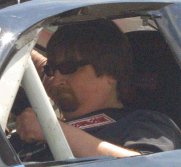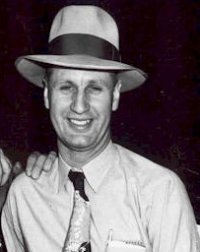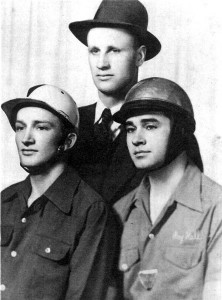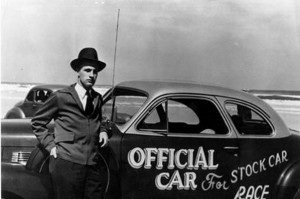
Brandon Reed
By Brandon Reed
Posted in Columns 6/26/09
Back on June 7, a large group of former racers and race fans gathered at Mr. J.B. Day’s place near Greenville-Pickens Speedway to wish Raymond Parks well in celebration of his 95th birthday.
It’s been a big year for Mr. Parks. In April, he was finally inducted into the International Motorsports Hall of Fame at Talladega, Alabama. The honor was a long time in coming. Many in the motorsports community had wondered why a person of Parks stature had been overlooked for so many years.
It’s very rewarding to see Mr. Parks get the recognition he so richly deserves.

Raymond Parks was a pioneer, and one of the main people who helped build stock car racing into what it is today.
Parks embodies the history of early stock car racing. His involvement elevated the sport to a new level. And, without him, there would likely be no NASCAR today.
Parks was born into meager surroundings in the North Georgia Mountains. Early on, he became involved in the illegal whisky business that saw men transporting liquor in Atlanta, traveling along Highway 9 out of Dawsonville, Georgia.
Parks later moved to the big city and helped to run the now legendary Hemphill Service station in Atlanta with his uncle, who was a part time bootlegger himself.
Parks was successful in this business, as well as a few other enterprises.

One of the most formidable trios in stock car racing ever. Parks and his drivers, Lloyd Seay (left) and Roy Hall (right).
Parks first taste of racing came just before the war. His cousins, Lloyd Seay and Roy Hall, both moonrunners themselves, convinced Parks to field entries for them in an event at the legendary Lakewood Speedway in Atlanta in 1938.
That first race resulted in Parks first win as a car owner, with Seay behind the wheel. The ultra-competitive Parks was hooked, and southern automobile racing was never to be the same. With Seay and Hall piloting his Fords, which were immaculately prepared by legendary mechanic Red Vogt, Parks saw his cars land in victory lane all over the southeast.
Parks entered Hall in the March 1940 stock car race on the treacherous beach and road course at Daytona Beach in Florida. With a faster car and better equipment, Hall came away with the victory.
That beach would become the Parks team’s playground for the next year, with Hall winning again in March of 1941, and Seay winning in August.
But tragedy would strike the Parks team in September of 1941. One day after winning the annual Labor Day event at Lakewood, Seay was shot dead by a cousin in an argument over moonshine.
The United States entry into World War II interrupted Parks’ racing ventures. He served with the 99th Infantry Division in Europe at the Battle of the Bulge.
Upon returning him in 1946, Parks resumed his racing enterprises. His legitimate vending machine business was successful enough to fund his efforts on the racetrack.
Vogt again wrenched the Fords for Parks’ team, which won all five races at Daytona Beach in 1945 and 1946.
Down in Daytona, Big Bill France was trying to get his own racing organization off the ground while he promoted the beach events. He was not a fan of the moonshine running Atlanta crowd, but their strong cars and popular fan following made them a necessary evil at his events.
In 1947, Fonty Flock piloted Parks’ team to the NSCC modified championship, which was France’s pre-cursor to NASCAR.
The Parks team’s domination carried over to the first NASCAR sanctioned race. It was a modified race at Daytona Beach in 1948, won by Red Byron. Byron went on to win the 1948 NASCAR championship. Byron, Vogt and Parks would follow up the next year by winning the first NASCAR Strictly Stock (now Sprint Cup) title.

Parks would help Bill France in many ways, from covering purses for races that France had no funds for to providing pace cars for events.
Parks was often the person France would turn to for advice as he worked to make NASCAR a success.
France would also call on Parks when money to run the new sanctioning body became tight. Without that help, it’s unlikely that NASCAR would have survived its first few seasons.
Parks was one of the major forces that brought southern stock car racing out of it’s rough and tumble beginnings – where a race promoter was more likely to run off with the purse money rather than pay the drivers – to one of the most popular forms of motorsports in the world.
Volunteers and fans in Georgia have long recognized his importance to the foundation of stock car racing. In 2002, Parks was among the first eight inductees to the Georgia Racing Hall of Fame.
And the honors aren’t over. Mr. Parks will again be honored later this year during the second annual Lakewood Speedway reunion at the Georgia Racing Hall of Fame in Dawsonville, Georgia. But the biggest honor anyone can pay to Raymond Parks is simply to remember him. In this age of public relations run motorsports, where a newcomer with a laptop can re-write history without regard to the truth, our job is to remember all that Raymond Parks did for auto racing.
Some have called Mr. Parks the “Godfather of NASCAR.”
I’ll take it one step farther. Raymond Parks is truly the Godfather of Georgia Automobile Racing.
Brandon Reed is the webmaster and editor for Georgia Racing History.com.
Questions, comments, suggestions? Email us!
This website is not affiliated with or endorsed by the Georgia Racing Hall of Fame or the Georgia Auto Racing Hall of Fame Association, Inc. All content is the intellectual property of the individual authors. All opinions are those of the individual authors. Please do not repost images or text without permission.
